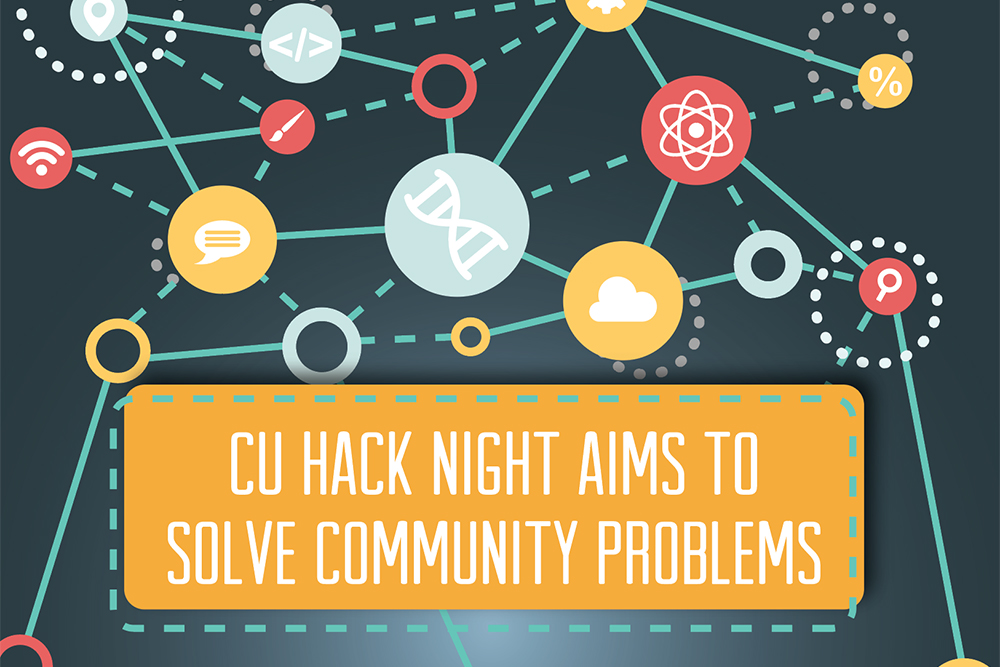CU Hack Night aims to solve community problems
September 21, 2017
The web has, from its founding, been a source of knowledge. Now, it is more than that — it is a source of data. Open data websites and computerized public records provide free, raw data to any interested party. Additionally, open source software, like Hadoop and WEKA, supplies anyone with an internet connection with free and abundant data analysis tools.
A 2016 study by the Pew Research Center found that about 73 percent of Americans have broadband service at home. This, combined with the reality that one can connect to the internet virtually anywhere in the country, shows that Americans have unprecedented access to information.
Any motivated person with internet access and adequate computer skills can analyze large quantities of data with little to no marginal costs.
Sanford Hess, information technology director of Urbana, is one of the co-founders of CU Hack Night, an initiative that began six months ago to bring together a diverse skill set to solve community problems by “hacking” data sets, literally.
CU Hack Night takes place every Tuesday from 6 to 8 p.m. at EnterpriseWorks in Research Park, but the location is changing in the coming months. The group is small, with an average of eight to 10 people per session, according to Hess.
Get The Daily Illini in your inbox!
Hess said the inspiration for CU Hack Night came from Chi Hack Night, which has been going on for about four years.
“The Chicago one is very focused on government. We, actually, are not so restrictive,” Hess said. “So, for example, one of the projects going on right now is with the Boys and Girls Club, which is just more about getting kids more hands-on access to technology.”
Another project the group is working on involves jail data from the police department.
“We’re trying to help the sheriff’s office understand the results of changes they’ve put in place in the past five years. So we’re looking at changes in sentencing, trackers for different kinds of crimes, how to free up space in the jails by looking at the busiest times,” Hess said. “They’re looking for some recommendations based on data analysis for changes they made since 2012.”
One of the only student attendees, Shreyas Gandlur, sophomore in Engineering, said he had always been interested in going to Chi Hack Night, and that he jumped on board when he saw the C-U version.
“I think that (CU Hack Night) can benefit (C-U) in the same way that Chi Hack Night benefited Chicago,” Gandlur said. “There were a lot of useful tools that came out of that. Urbana has a lot of the open data sets that Chicago has. So, for example, you can use that data to look at racial disparities, class disparities, disparities between the county itself … between Champaign and Urbana, or between urban and rural divides.”
Though C-U faces the same kinds of social and economic problems all cities face, Hess said they are having problems getting people to identify the community’s problems.
“We want people to come with problems as well as the motivation to solve those problems. Identifying and bringing attention to the problem is just as important as the technical work we do to solve those problems. Our biggest challenge has been that,” Hess said.
“I would like to see Hack Night grow by having lots of projects going on. Instead of having two or three projects at a time, it would be nice to have 10 or 15.”
Gandlur echoed Hess’s wish for more projects, adding that he hopes the club will grow in size as well.
“If there were more people it would be more lively, more projects, all of that. There are so many engineering organizations, (computer science) organizations, with all these people doing data related stuff. I’m sure some of them want to help the community in some way,” Gandlur said.
According to Hess, the community appreciates, but doesn’t always understand, Hack Night’s efforts. He believes this may have to do with the negative connotation associated with the term “hack.”
“People are really interested in this, but sometimes it’s a little confusing and it’s a little hard to follow,” Hess said. “So, it works best when we’ve got an end product that we can show people and say, ‘Look, this is what we’ve done.’”
Gandlur said CU Hack Night is also a great networking opportunity for students, providing an informal environment to engage with professionals as equals.
“This is a community event,” Gandlur said. “Here you have retired programmers, you have professors, you have people working at the NCSA, you have more than just students. You have the entire community coming together.”







